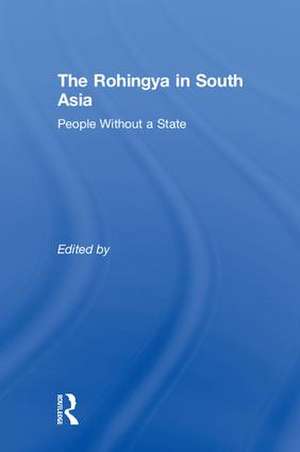The Rohingya in South Asia: People Without a State
Editat de Sabyasachi Basu Ray Chaudhury, Ranabir Samaddaren Limba Engleză Hardback – 11 iul 2018
This book looks at the Rohingya in the South Asian region, primarily India and Bangladesh. It explores the broader picture of the historical and political dimensions of the Rohingya crisis, and examines subjects of statelessness, human rights and humanitarian protection of these victims of forced migration. Further, it chronicles the actual process of emergence of a stateless community – the transformation of a national group into a stateless existence without basic rights.
| Toate formatele și edițiile | Preț | Express |
|---|---|---|
| Paperback (1) | 301.84 lei 3-5 săpt. | |
| Taylor & Francis – 11 iul 2018 | 301.84 lei 3-5 săpt. | |
| Hardback (1) | 1000.27 lei 6-8 săpt. | |
| Taylor & Francis – 11 iul 2018 | 1000.27 lei 6-8 săpt. |
Preț: 1000.27 lei
Preț vechi: 1219.84 lei
-18% Nou
Puncte Express: 1500
Preț estimativ în valută:
191.46€ • 208.04$ • 160.93£
191.46€ • 208.04$ • 160.93£
Carte tipărită la comandă
Livrare economică 21 aprilie-05 mai
Preluare comenzi: 021 569.72.76
Specificații
ISBN-13: 9781138743458
ISBN-10: 1138743453
Pagini: 230
Ilustrații: 2
Dimensiuni: 152 x 229 x 14 mm
Greutate: 0.45 kg
Ediția:1
Editura: Taylor & Francis
Colecția Routledge India
Locul publicării:Oxford, United Kingdom
ISBN-10: 1138743453
Pagini: 230
Ilustrații: 2
Dimensiuni: 152 x 229 x 14 mm
Greutate: 0.45 kg
Ediția:1
Editura: Taylor & Francis
Colecția Routledge India
Locul publicării:Oxford, United Kingdom
Public țintă
PostgraduateCuprins
1. Stateless, floating people: the Rohingya at sea 2. Where do #ibelong? The stateless Rohingya in India 3. The stateless people: Rohingya in Hyderabad 4. The jailed Rohingya in West Bengal 5. Rohingya in Bangladesh and India and the media planet 6. Legal brief on statelessness: law in the Indian context 7. Reducing statelessness: a new call for India
Notă biografică
Sabyasachi Basu Ray Chaudhury is a Professor in the Department of Political Science, Rabindra Bharati University, Kolkata, India. He is also Honorary Director, Centre for Nepal Studies, and is the founder Head, Department of Human Rights and Human Development at the same university. He has been the Vice Chancellor of Rabindra Bharati University since 2012 and is a member of the Calcutta Research Group. His areas of interest include international relations, South Asian politics, refugee studies and human rights. He is among the few experts in India on the Andaman and Nicobar Islands. He is a regular contributor to academic journals, periodicals, dailies, news channels and portals. His publications include Indian Autonomies: Key Words and Key Texts (co-edited with Ranabir Samaddar and Samir Kumar Das, 2005); Internal Displacement in South Asia: The Relevance of UN’s Guiding Principles (co-edited with Paula Banerjee and Samir Kumar Das, 2005); and Rights after Globalisation (co-edited with Ishita Dey, 2011).
Ranabir Samaddar is currently Distinguished Chair in Migration and Forced Migration Studies, Calcutta Research Group, Kolkata, India. He belongs to the critical school of thinking and is considered one of the foremost theorists in the field of migration and forced migration studies. His writings on the nation state, migration, labour and urbanization have signalled a new turn in critical post-colonial thinking. Among his influential works are The Marginal Nation: Transborder Migration from Bangladesh to West Bengal (1999); Beyond Kolkata: Rajarhat and the Dystopia of Urban Imagination (co-authored, 2014); and Karl Marx and the Postcolonial Age (2017).
Ranabir Samaddar is currently Distinguished Chair in Migration and Forced Migration Studies, Calcutta Research Group, Kolkata, India. He belongs to the critical school of thinking and is considered one of the foremost theorists in the field of migration and forced migration studies. His writings on the nation state, migration, labour and urbanization have signalled a new turn in critical post-colonial thinking. Among his influential works are The Marginal Nation: Transborder Migration from Bangladesh to West Bengal (1999); Beyond Kolkata: Rajarhat and the Dystopia of Urban Imagination (co-authored, 2014); and Karl Marx and the Postcolonial Age (2017).
Descriere
This book looks at the Rohingya in the South Asian region, primarily India and Bangladesh. It explores the broader picture of the historical and political dimensions of the Rohingya crisis, and examines subjects of statelessness, human rights, and humanitarian protection of these victims of forced migration.
